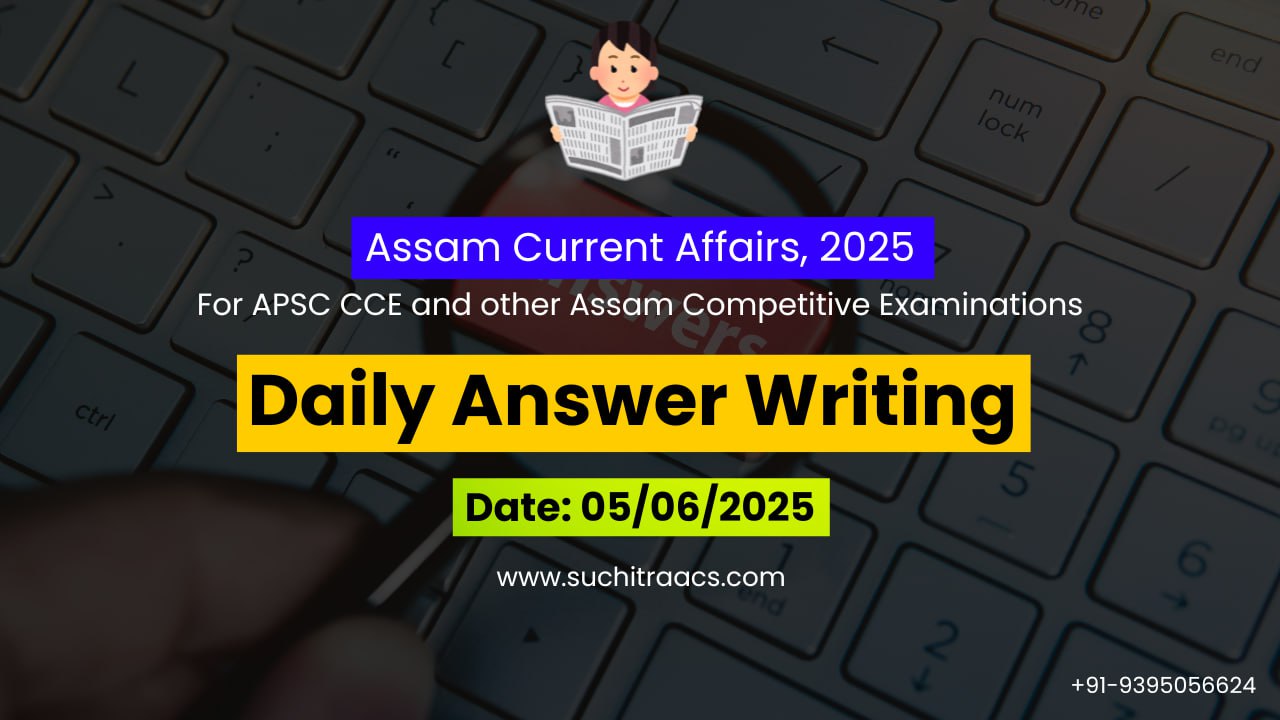APSC Answer Writing (Daily) based on Assam Tribune – 05/06/2025
For APSC CCE and other Assam Competitive examinations aspirants, practicing Daily Answer Writing is vital. This blog covers the most important Main question and its model Answer from the Assam Tribune today (05-06-2025).
📝 Mains Question (GS Paper 2 – Governance | Social Justice | Policy Reform):
Q. Critically examine the relevance of the Caste Census in contemporary India. How can a caste-based enumeration aid in reforming affirmative action while managing the risks of social fragmentation?
📘 Model Answer
Introduction
India’s social justice policies—particularly reservation and targeted welfare schemes—rest on the assumption of caste-based disadvantage. However, the absence of reliable caste data (except for SC/ST) since 1931 has hampered evidence-based policymaking. The Caste Census 2027, recently announced by the Government, seeks to fill this void by gathering comprehensive socio-economic and caste-wise data.
Why the Caste Census Is Relevant Today
1. Data-Driven Affirmative Action
- Current quotas (especially for OBCs) are based on outdated estimates, primarily from the Mandal Commission (1980) using 1931 data.
- A modern census enables calibration of reservation based on actual need.
2. Identification of Intra-Group Disparities
- Within OBCs, dominant sub-castes often corner benefits.
- A caste census can enable sub-categorization, as recommended by the Justice Rohini Commission.
3. Rationalization of Welfare Schemes
- Enables targeted delivery under PM Vishwakarma Yojana, EWS benefits, etc.
- Allows mapping of educational, health, income gaps among different caste groups.
4. Empowering Marginalized Communities
- Many communities seek inclusion in SC/ST/OBC lists. Reliable data can depoliticize inclusion and ensure legal soundness.
Risks and Challenges
| Challenge | Explanation |
| Social Polarization | Political mobilization around caste identities may intensify post-census. |
| Privacy and Consent | Citizens may fear misuse of identity data in absence of data protection law. |
| Quality and Integrity | Risk of over-reporting or fake caste claims without standardized classification. |
| Legal Complexity | May lead to demands for increased reservation, hitting the 50% cap set in Indra Sawhney v. Union of India (1992). |
Relevance for Assam and Northeast India
- Multi-ethnic composition (Tea Tribes, Ahoms, Morans, ST Hills/Plains) complicates reservation politics.
- Past issues with SECC 2011 and NRC-related tensions show data sensitivity.
- Caste Census data may support or settle inclusion debates over ST status for several communities.
- Must align with existing Sixth Schedule governance and Autonomous Council laws.
Way Forward
✅ Institutional Mechanisms
- Establish an Independent Social Data Commission for classification and oversight.
- Build consensus via Backward Classes Commissions at the state level.
✅ Methodological Rigor
- Standardize caste categories using ethnographic verification and self-declaration.
- Train enumerators and use digital verification to avoid duplication.
✅ Public Trust & Safeguards
- Ensure confidentiality under Census Act, 1948.
- Mandate use of caste data solely for policy planning, not for electoral profiling.
✅ Integrate with Welfare Delivery
- Link with Aadhaar-enabled Direct Benefit Transfer (DBT) to track and monitor benefit reach.
- Use caste census findings to upgrade poverty and social exclusion indices.
Conclusion
The Caste Census 2027 is a crucial opportunity to realign India’s affirmative action architecture with present realities. If conducted with integrity, transparency, and institutional safeguards, it can bridge the gap between policy intent and social outcomes. However, the government must ensure that data collection does not deepen social fault lines, but strengthens social cohesion and justice.
✨ Looking for top-quality APSC Mains Guidance with Personalised Mentor?

🔔 Join Our WhatsApp Study Group!
For exclusive access to premium quality content, including study materials, current affairs, MCQs, and model answers for APSC CCE and other Assam competitive exams.
Click here to join: SuchitraACS Study WhatsApp Group
📚 Want to know more about SuchitraACS’s most affordable courses?
Click here to know more: SuchitraACS Courses for APSC CCE and Assam Competitive Examinations




